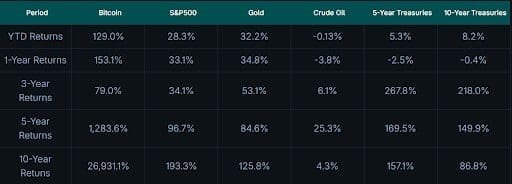In recent years, a growing number of companies have started allocating a portion of their reserves to bitcoin. This trend has emerged as businesses explore alternatives to protect purchasing power, diversify treasury holdings, and hedge against inflation.
Traditional fiat currencies lose purchasing power over time due to inflation. Bitcoin, on the other hand, as a decentralized and finite asset, is proving to be a compelling store of value for forward-thinking companies.
Companies are adding bitcoin to their balance sheets for several strategic, financial, and ideological reasons. Let’s have a look at some of them below.
Hedge Against Inflation And Currency Devaluation
“Bitcoin is the universal, perpetual, profitable merger partner for every company on Earth. The only question is: Are you ready to make the merger?” said Strategy CEO Michael Saylor.
Companies see bitcoin as a way to preserve the value of their capital over the long term, especially compared to holding large amounts of cash, which can be eroded by inflation.
With potential concerns about government money printing and the devaluation of traditional currencies, bitcoin is viewed as a decentralized alternative that is not subject to the same monetary policies.
One of the new tools in understanding bitcoin’s purchasing power is the Samara Asset Group’s Bitcoin CPI. While traditional CPI tracks changes in the cost of a fixed basket of goods and services in fiat currencies, the Bitcoin CPI goes a step further by measuring how that same basket performs when priced in bitcoin.
Over time, the BTCCPI reveals a fascinating trend: the purchasing power of bitcoin has increased significantly, requiring less bitcoin to buy the same goods and services compared to fiat currencies.
By incorporating bitcoin into their balance sheets, companies are not simply participating in a speculative investment. They are leveraging bitcoin’s intrinsic properties: scarcity, decentralized nature, and historical performance as a store of value.
Portfolio Diversification
One of the core principles of treasury management is diversification, spreading exposure across different asset classes to reduce risk. Bitcoin is becoming an appealing option as it has historically shown a low to moderate correlation with equities and almost no correlation with bonds.
This makes it a potentially valuable asset for diversifying corporate treasury holdings, as it may perform differently from traditional assets during market downturns.
While equities and bonds often move in response to macroeconomic trends like interest rate shifts or central bank policy, bitcoin behaves differently. It’s driven by a distinct set of market forces, such as supply constraints, investor sentiment, regulatory news, and crypto-native cycles. This independence can make it a useful hedge during times when traditional markets are underperforming.
By adding a less correlated asset with the potential for significant returns, companies aim to improve the overall risk-adjusted returns of their balance sheet.
Strategic And Technological Alignment
How a company positions itself technologically can influence everything from customer trust to investor interest. Holding bitcoin is increasingly seen not just as a financial decision, but as a strategic signal.
For forward-thinking companies, adding bitcoin to the balance sheet communicates a commitment to embracing open, decentralized technologies, showing the company understands the long-term potential of digital assets and fintech.
Companies involved in the cryptocurrency industry, holding bitcoin can be a natural extension of their business and demonstrate their commitment to the ecosystem. Beyond optics, this move can also attract strategic partners who prioritize innovation and see bitcoin as part of the future of value exchange.
Potential For Significant Returns
Over the past decade, bitcoin has been one of the best-performing assets, with a compound annual growth rate exceeding many traditional asset classes. Even with its notorious volatility and cyclical drawdowns, the long-term trajectory has been overwhelmingly positive.

For companies with a longer time horizon and a tolerance for short-term price swings, bitcoin is more than a hedge; it’s a high-conviction bet on the future of money.
It represents an opportunity to gain exposure to an asset class still in its early adoption phase, with asymmetric upside.
Regulatory Clarity Is Improving
Navigating the legal and regulatory landscape is important for any publicly traded or even large private company, but as bitcoin gains wider legal and regulatory recognition, holding it on balance sheets has become less risky from a compliance perspective.
Clearer regulations often lead to the establishment of more reputable and regulated entities within the Bitcoin ecosystem. This reduces the counterparty risk associated with dealing with unregulated or opaque platforms.
Companies can be more confident in engaging with regulated exchanges, custodians, and other service providers.
Final Thoughts
Bitcoin is no longer just a speculative asset; it’s becoming a part of corporate financial strategy.
While it’s not for every company (and certainly not without risk), bitcoin offers a mix of inflation protection, portfolio diversification, and upside potential that’s hard to ignore.
Whether it’s a bold treasury move or a strategic alignment with crypto-native products, the trend is clear: bitcoin is finding a home on corporate balance sheets. And as infrastructure improves and institutional comfort grows, more companies will potentially follow suit.

